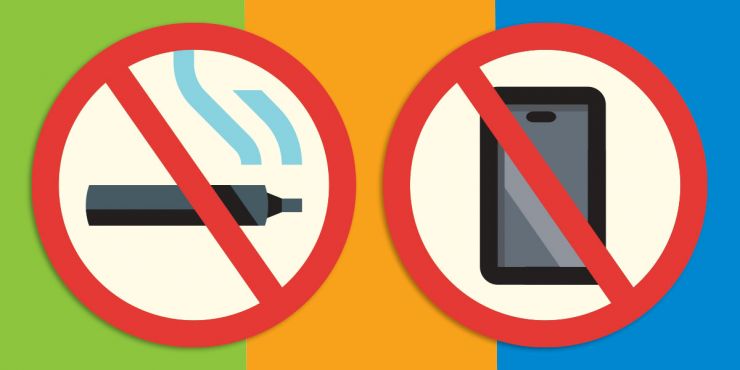
Vaping and Personal Mobile Devices
Effective September 2024, all Ontario school boards will be required to follow the Ministry of Education’s update to the Provincial Code of Conduct to promote healthy and welcoming learning environments. This includes all students being required to follow strict anti-vaping and personal mobile device use guidelines.
When can students use a mobile device?
Students must not use cell phones and other personal mobile devices during instructional time. During instructional time, devices must be turned off or set to silent mode and stored out of view.
- Students in K to Grade 6 can use a mobile device before- and after-school, if permitted based on school policies.
- Students in Grade 7 and 8 can use a mobile device during recess/breaks or lunch, if permitted based on school policies.
- Grade 9 to 12 students can use a mobile device during breaks or lunch.
Students can use their mobile device during learning time only when:
- a teacher says to use it as part of learning, for example, doing research or visiting a specific website.
- it’s needed for a health or medical reason.
- it supports special education needs.
What does the use of mobile devices look like in my child(ren)’s school?
Some schools have had their own policy for the use of mobile devices. Those policies remain in effect if they meet the new minimum requirements of the Ministry of Education.
For the schools without an already established policy, they will adopt the new Ministry requirements. If you have any questions, please check with your child(ren)’s Principal.
Are social media applications banned in Grand Erie schools?
Effective July 1, 2024 the following social media sites will be blocked for students:
| 4chan | Lainchan | Snapchat | Twitch | |
| 8chan | Gab | Parler | Telegram | Twitter/X |
| 8Kun | InfinityChan | TikTok | Voat | |
| Discord | Truth Social | |||
| Endchan | Kiwi Farms | Ruqqus | Tumblr | Wizardchan |
*Subject to be updated
What does this ban on vaping mean for students?
Students cannot bring electronic cigarettes (vapes), tobacco and/or nicotine products to school, including school transportation.
If a student is in possession of an electronic cigarette (vape), tobacco or nicotine product it will be surrendered and disposed of, and parents/guardians will be immediately informed.
Do you have any resources for students who vape?
- School Mental Health Ontario and the Centre for Addiction and Mental Health have compiled resources to find a healthy balance in using technology and screen time at home
- Talking with your teen about vaping: A tip sheet for parents from Health Canada
- Drug Free Kids Canada has a fact sheet with ideas about how to talk to your child about vaping, as well as general information about vaping.
How are the public health units supporting?
The schools are working with their local health unit (Brant County Health Unit or Haldimand-Norfolk Health Unit) to ensure that the Smoke-Free Ontario Act, 2017 is enforced. BCHU has a resource for youth and families who want help with vaping or smoking.
Resources
- Grand Erie letter to families – September 4, 2024
- Ministry of Education - New School Rules: Cellphones, Vaping and Cannabis
- Code of Conduct Procedure SO-012
- Acceptable Use of Information Technology Procedure IT-001
- PPM 128 Provincial Code of Conduct
- Ministry of Education letter to families – April 28, 2024
The Smoke-Free Ontario Act, 2017 prohibits smoking (tobacco and cannabis) and the use of electronic cigarettes (vaping) at schools, on school grounds and all public areas within 20 metres of these grounds. Anyone smoking or vaping on school property is guilty of an offence and if convicted may result in a fine under the Smoke-Free Ontario Act, 2017.
Healthy Bites Success for Graham Bell-Victoria Students
Graham Bell-Victoria School has been presented with a GOLD award of recognition and achievement in the Healthy Bites Program. The staff and students have worked hard and enjoyed the “fruits” of their labour as they have now been recognized with GOLD!
Throughout the year, Sonia Martin, school health nurse with the Brant County Health Unit, has lead our staff and students in a variety of healthy eating awareness activities. These included a Mystery Fruit and Vegetable contest, a trivia question in the monthly newsletter, and healthy fruit and vegetable snacks every Friday. These tasty treats, prepared by the grade 4-5 class were a big hit and helped us learn about the benefits of eating healthy.
Next year the program will be expanded to Healthy Steps and Healthy Bites, a program in which we will learn about and practice healthy eating and healthy activity. Congratulations, Graham Bell!
Voluntary Aboriginal Self-Identification
The Grand Erie District School Board recognizes the importance of school success for Aboriginal students. Our dedicated staff members are committed to improving services and programs for Aboriginal students attending school in the Board.
With a goal to improve the school experience for all Aboriginal students, the Board encourages the development of strong partnerships with Aboriginal families, communities and organizations, both on and off the reserve.
Through the Voluntary Aboriginal Self-Identification process, Aboriginal parents and students will have access to additional support services, including educational, social, and emotional supports that focus and foster Aboriginal identity, culture and values.
There are three categories of Voluntary Aboriginal Self-Identification – First Nation, Métis, or Inuit.
Your child may bring a GEDSB Voluntary Aboriginal Self-Identification form home or if not, you can contact your child’s school to receive a form. You can also, visit the Aboriginal Education section under the Program tab at www.granderie.ca for more information and a copy of the Voluntary Self-Identification form.
More News




